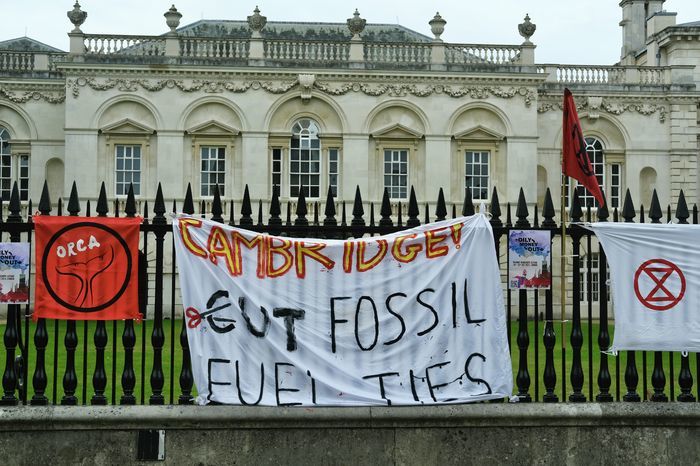Cambridge students boycott Barclays over fossil fuel ties
The ‘career boycott’ includes students from the UK’s top universities, including Oxford and UCL

Cambridge students have joined a ‘career boycott’ of Barclays over its climate policies, vowing against being employed by the bank until it cuts ties with the oil and gas industries.
The boycott comes amid growing pressure on the bank to distance itself from fossil fuels, with the University of Cambridge reportedly considering cutting its centuries-long ties with Barclays.
In a letter addressed to ‘Barclays bosses’, student campaigners promised that they would be “taking our talent to exciting employers who are working on solutions to the problems we’re facing, rather than piling billions into making it worse.”
The ‘career boycott’, launched by Students Organising for Sustainability UK (SOS), means that hundreds of students from universities including Cambridge, Oxford and UCL will not consider the bank in their upcoming job applications.
Cambridge's involvement in the boycott was organised by Cambridge Climate Justice (CCJ), a group of student activists at the University.
A spokesperson for CCJ said: “One of the shadiest links between this University and climate destruction is through the banks. [...] The career pipeline between universities like ours and the banks tricks students into unknowingly supporting climate breakdown. The most powerful tool we have is withdrawing this support.”
“This letter shows the power of that growing number of students getting wise to the banking industry's complicity in environmental destruction. We know what they're doing, and we won't work with them till they stop.”
Michelle Hemmingfield, a representative of SOS, said: “New recruitment of the younger generation will be another headache for Barclays as long as it continues to finance companies building new oil and gas infrastructure, since it relies heavily on STEM applicants from Oxbridge and other top universities.”
A part of SOS’s wider ‘Breaking the Bank’ campaign, the letter demands that Barclays end all financing of fossil fuel companies involved in new oil and gas projects, end funding for coal-producing companies by 2030, and increase its financing of clean energies.
A spokesperson for Barclays responded: “Aligned to our ambition to be a net zero bank by 2050, we believe we can make the greatest difference by working with our clients as they transition to a low-carbon business model, reducing their carbon-intensive activity whilst scaling low-carbon technologies, infrastructure and capacity.
“We have set 2030 targets to reduce the emissions we finance in five high-emitting sectors, including the energy sector, where we have achieved a 32% reduction since 2020. In addition, to scale the needed technologies and infrastructure, we have provided £99bn of green finance since 2018, and have a target to facilitate $1tn in sustainable and transition financing between 2023 and 2030.”
The letter pointed to Barclays’ continued funding of oil and gas firms such as Shell, TotalEnergies, Exxon and BP. “Your ambitious decarbonisation targets are discredited by your absence of action and the roster of fossil fuel companies on your books,” it said.
“You may say you’re working with them to help them transition, but Shell, Total and BP have all rowed back,” the letter stated, pointing to the record profits the energy firms made this year by increasing production of oil and gas.
The career boycott follows news earlier this month (15/12) that Cambridge University could be cutting its two-centuries-old partnership with the bank, also over its financing of fossil fuel projects.
The University announced its intention to find a new institution that aligned with its climate policies to manage its millions of pounds worth of assets, which could cover more than £200 million and related fees as high as £10 million.
In an official statement, the University said that it was “exploring opportunities to find financial products that do not finance fossil fuel expansion, particularly those which invest in new coal and gas-fired power plants that lock in customer demand for decades.
“This is part of the University’s net zero engagement strategy with the banking sector and is intended to challenge all financial institutions to stop investing in the expansion of fossil fuels”, it added.
Barclays responded: “We are committed to financing the energy transition, investing in the climate technologies required to build low-carbon capacity as we support those clients investing to achieve net zero.
“It is our privilege to bank and support Cambridge University.”
A number of other high-profile clients moved operations to rival banks earlier this year, with the charity Christian Aid and Leeds University switching to Lloyds. Both cited fossil fuel concerns as the motive for the change.
Cambridge’s announcement comes after ongoing pressure from student bodies to reduce its involvement with fossil fuel industries. In 2020 the University declared its intention to divest its £3.5 billion endowment fund away from fossil fuels by 2030.
The Topping Report into the University’s ties with major polluters published in June (06/23) advised that Cambridge should stop accepting fossil fuel company funding for research.
It stated that companies like BP and Shell are not aligned with the University’s decarbonisation ambitions “on any level”, and that accepting funding poses “high reputational risk.”
 News / Under 3% of applicants for Cambridge academic jobs are successful7 April 2025
News / Under 3% of applicants for Cambridge academic jobs are successful7 April 2025 Film & TV / Adolescence: understanding the manosphere5 April 2025
Film & TV / Adolescence: understanding the manosphere5 April 2025 Lifestyle / Which college brunch should be next on your list?6 April 2025
Lifestyle / Which college brunch should be next on your list?6 April 2025 News / News in Brief: cats, Camelot, and construction woes6 April 2025
News / News in Brief: cats, Camelot, and construction woes6 April 2025 News / Boat race rowers in danger of sepsis and kidney failure from polluted water5 April 2025
News / Boat race rowers in danger of sepsis and kidney failure from polluted water5 April 2025






